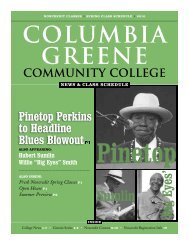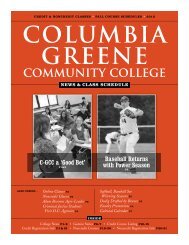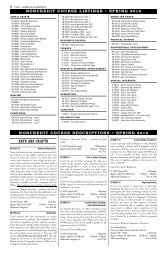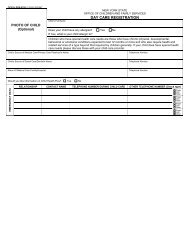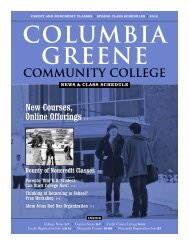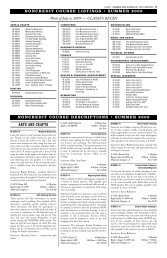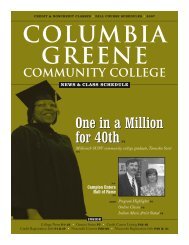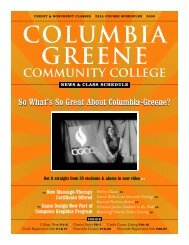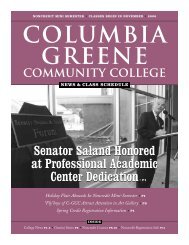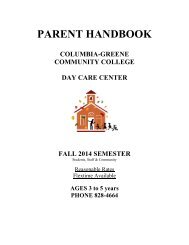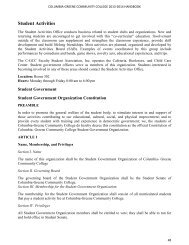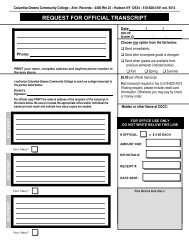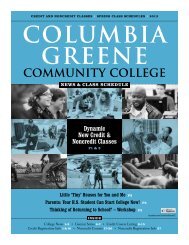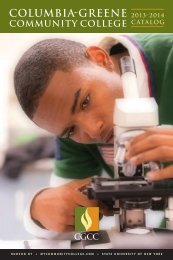Current C-GCC Catalog - Columbia-Greene Community College
Current C-GCC Catalog - Columbia-Greene Community College
Current C-GCC Catalog - Columbia-Greene Community College
You also want an ePaper? Increase the reach of your titles
YUMPU automatically turns print PDFs into web optimized ePapers that Google loves.
COLUMBIA-GREENE COMMUNITY COLLEGE 2012-2013 CATALOG<br />
sources of fuel as well as nonpolluting<br />
power plants will be explored. (2 lecture<br />
hours/6 lab hours) (4 semester hours)<br />
Spring<br />
Au 128—introduction to Automotive<br />
repair<br />
This course introduces the student to the<br />
feld of automotive technology and to<br />
develop the basic skills, knowledge and<br />
professional ethics necessary as an entrylevel<br />
technician in areas of automotive<br />
maintenance, service repair, parts and<br />
pre-delivery device. The objectives of this<br />
course are developed through classroom<br />
and laboratory activities. Personal and<br />
shop safety, and the proper utilization<br />
of service information are emphasized.<br />
This course meets Toyota T-TEN degree<br />
requirements. (2 lecture hour/6 lab hours)<br />
(4 semester hours) Fall<br />
Au 129—heating, Ventilation and Air<br />
Conditioning (HvAC)<br />
This course is designed to introduce the<br />
student to the theory of HVAC systems<br />
and to develop the skills and knowledge<br />
necessary to diagnose and service<br />
automotive heating and air conditioning<br />
systems, and environmental effects<br />
of chlorofuorocarbons on the earth’s<br />
atmosphere. Included also, principles<br />
of refrigeration, reclaiming, evacuation,<br />
recycling and recharging and other<br />
diagnostic testing. This course meets<br />
the requirement of the Toyota T-TEN<br />
programs. (1 lecture hour/ 6 lab hours) (3<br />
semester hours) Fall<br />
AU 130—Basic steering, suspension &<br />
Brakes<br />
This course is intended to develop the<br />
skills, knowledge and professional<br />
ethics required to service general<br />
automotive steering, suspension and brake<br />
systems. The objectives of this course<br />
are developed through classroom and<br />
laboratory activities. Special emphasis<br />
180<br />
is placed on personal and shop safety,<br />
component identifcation and inspection,<br />
proper use of service information, special<br />
service tools and equipment, interpretation<br />
of data and adjustment techniques. This<br />
course meets the Toyota T-TEN degree<br />
requirements. (2 lecture hour/6 lab hours)<br />
(4 semester hours) Fall<br />
AU 131—Work-study i<br />
Students completing their second<br />
semester in automotive technology must<br />
work at their sponsoring dealership or<br />
independent repair facility for a 12-week<br />
period. This hands-on job experience<br />
introduces students to actual work<br />
situations and reinforces skills learned<br />
during the year. Grading is Satisfactory<br />
(S) or Unsatisfactory (U). NOTE: Many<br />
employers require a DMV driver’s<br />
background check. Having a poor driving<br />
record can prevent your employment in an<br />
automotive repair facility. Prerequisite:<br />
Successful completion of the frst year of<br />
the A.A.S. or A.O.S. Automotive Program.<br />
(2 semester hours) Summer<br />
AU 132—electricity and electronics<br />
Develops those skills needed by today’s<br />
technicians to diagnose, service, and<br />
repair the electrically and/or electronically<br />
operated systems of automobiles. Topics<br />
covered include basic electrical and<br />
electronic principles and components,<br />
electrical wiring diagrams, the battery,<br />
starting, and charging systems.<br />
Component location and system operation<br />
will be stressed. (3 lecture hours/3 lab<br />
hours) (4 semester hours) Fall<br />
AU 134—engine Performance<br />
This course is designed to provide those<br />
skills necessary for the diagnosis and<br />
repair of the engine’s ignition, fuel and<br />
emission systems. Emphasis will be<br />
placed on computer controlled engine<br />
management, scan tool usage, and correct<br />
diagnostic philosophy. Optimum engine



